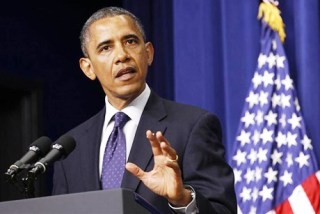Obama hints on threats for increased sanctions, arms embargo on S. Sudan
July 27, 2015 (ADDIS ABABA) – The United States president, Barack Obama has hinted on the possibilities of increased sanctions and an arms embargo on South Sudan, should its leaders fail to meet the 17 August deadline set by the regional mediators.

“As a consequence of this discussion, our hope is that we can actually bring about the kind of peace that the people of South Sudan so desperately need,” the US leader told regional leaders, who included Uganda’s Yoweri Museveni, Kenya’s Uhuru Kenyatta, the chairperson of the African Union and Ethiopia’s prime minister, Hailemariam Desalegn.
Conflict broke out in South Sudan in December 2013 when President Salva Kiir accused his former deputy, Riek Machar disagreed on certain political reforms in the ruling party.
Since then, tens of thousands of people have died and close to two million displaced in what is regarded as the worst-ever violent conflict in South Sudan’s post-independence period.
“The conditions on the ground are getting much, much worse,” said Obama, further warning that if the two sides failed to sign what could be their last chance to seal the agreement, then Washington and its partners would have to “consider what other tools we have.”
The regional bloc mediating the peace process has given the country’s two warring factions until the 5 August to study the draft document of the agreement likely to bring a lasting peace deal.
According to IGAD, the two parties will resume talks on 6 August while the final peace deal is expected to be signed on 17 August.
Analysts argue that failure by both parties meet the IGAD deadline could attract sanctions, including economic and an arms embargo.
John Prendergast, founding director of the Enough Project said Obama should be commended for meeting with the regional leaders about South Sudan, despite the unlikelihood of success.
“His warning of a Plan B that would be put in play if the parties do not reach agreement on August 17 is exactly the right message to send to build leverage for the success of the mediation,” he said.
“Preparations should begin now to create as robust and draconian a Plan B as possible, targeting senior officials right up the chain of responsibility on both the government and rebel side, and anyone funding or arming the parties. Going after their wallets is the surest way to get the attention of those destroying South Sudan,” added Prendergast in a statement issued Monday.
OPEN UP POLITICAL SPACE
Meanwhile, Obama called for opening of more political space in Ethiopia, a country rights groups consider to be politically repressive.
Flanked by the Ethiopian Prime Minister, Hailemariam Desalegn, Obama urged leaders in the horn of African nation to halt continuous crackdown on journalists and the opposition voices.
“I believe that when all voices are being heard, when people know that they are included in the political process that makes a country stronger and more successful and more innovative” he said.
However, a number of rights entities and opposition groups criticised the US leader for visiting Ethiopia, arguing that his visit legitimises the country’s oppressive tactics to silence dissent and critical voices.
But the Ethiopian premier said his country was emerging out of centuries of undemocratic paths and had seen more progress in democratisation in past decades.
“Our commitment to democracy is real and not skin deep,” he said, adding “This is fledgling democracy. We are coming out of centuries of undemocratic practices”.
Obama will Tuesday address the African Union, with the fight against terrorism and resolving regional conflicts likely top of the day’s agenda.
(ST)
